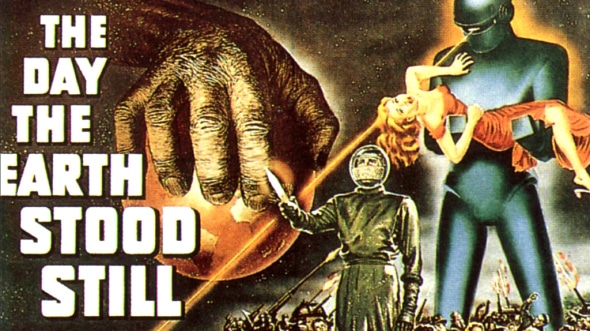
Every week, I provide an outlandish commentary on a classic film, and you pretend I’m competent at my job. We all win, so feel free to play along at home!
I got tired of everyone talking about how this movie is such a great social commentary on the United States’ inherent xenophobia. We should all learn a lesson of peace and forgiveness and understanding for our neighbors while shopping for Grape Nuts and Tevas and bras to burn.
Well, enough. Today, I’ll show that The Day the Earth Stood Still is actually about how kick ass the United States is for having a ton of nuclear weapons and how shooting first and asking questions never is the right attitude to have toward strangers.
Just go with me on this for a second.
The Run Down
Alien lands in Washington. Authorities shoot alien. Alien recovers, goes into hiding, solves a complex physics equation and demands an audience with the leaders of every country in the world to deliver an important message. Somewhere along the way, alien falls in love and has robot kill for him.
The Stretch
Since the US government shoots the devilishly handsome, human-looking Klaatu almost as soon as he pops out of his sweet spacecraft, they’re obviously the bad guys of the story, representing hubris, machismo and fear of the unknown. The story is a morality play of Twilight Zone proportions, especially considering that the being we keep trying to kill is only trying to bring us a message of peace and understanding.
That’s one way of looking at it. The wrong way.
In reality, Klaatu is a citizen of a technologically advanced society visiting a less-advanced world to tell them that if they continue building atomic weapons, his planet will have to annihilate them to secure their own safety. Sound familiar? Of course it does. It’s the message the United States was sending other nations during the Cold War. We can have nukes, but you can’t, and if you try to get them, we’ll nuke you. With our nukes. Thus, the handsome alien, while shaped nothing like the country, actually represents The United States.
Here’s where it might get confusing. As a backward society that lacks the most technologically advanced weapons in the universe, The United States represents every other country in the world but the United States (specifically Communist Russia). A smug, know-it-all, dominant force has entered the country telling its citizenry that it will be destroyed if it seeks to have more power, much like every foreign power the United States bullied into discontinuing a nuclear power program. Therefore, The United States is Not The United States.
Since the film was made in the 1950s, it seems clear that Klaatu’s love affair with Helen mimics the United States’ growing love affair with Popular Fast Food Chains. At first, Helen is off limits, something that a younger, more reckless Klaatu would enjoy if he drove a Hot Rod, but after engaging in a semi-inappropriate relationship with her son Bobby (who obviously represents Frozen TV Dinners) Klaatu realizes that the health risks involved in eating too much fast food are outweighed by the convenience and the way she feels on his lips.
Gort, the robot with the heart of gold, represents The United States Economy. Steadfast, he stands tall and strong against the onslaught of The US Military (which represents The Soviet Military), never wavering even in the face of outsourcing or foreign competition. He’s also able to liquidate tanks and people with a really nifty eye-laser. Just like the real economy.
Near the end of the film, Klaatu (The United States) teaches Helen (The Fast Food Industry) how to control the robot (The US Economy). Thus, the mantel of power is handed over to a growing corporate interest that, to this day, runs the nation’s fiscal policy with a ground-beef fist.
Perhaps that is the most chilling message of all.
Finally, the iconic phrase uttered by Klaatu to stop Gort from killing – Klaatu Barada Nikto – is probably Latin for “Klaatu is true in the nighttime”. Since Klaatu represents The United States, it clearly means that US military action is correct in the darkest of times or, a more literal translation: anything the US government does is justifiable during wartime.
Thus, you have the true message of the film.
The Recap
Klaatu, with his weapons of mass destruction, represents The United States. The United States, fearing outsider invasion, represents Soviet Russia. Helen, who is fast and convenient but bad for your health, represents greasy burger joints. Her son Bobby, who is easily attainable and ready to eat after three minutes on High, represents microwavable meals. And Gort, programmable and armed with a laser, represents the US economy.
Peaceniks would have you believe that the film is a statement condemning the United States for being a fascist, military-driven complex that wants to blow up the planet. In reality, the movie praises the United States (via Klaatu) for being handsome and for pleasantly warning a backward people that they’ll be bombed back into the stone age if they attempt to subvert US superiority. Klaatu could have easily aimed a high-powered laser at Earth, reducing it to space dust, but instead,he bravely (and handsomely) chose to use bureaucracy to give world leaders an ultimatum of peace. Bloody, violent peace.
Not content with just one social message, the film also predicts the rise of the fast food epidemic that would one day overwhelm the nation with obesity and cause Morgan Spurlock to eat nothing but hamburgers for thirty days. Clearly, any film that could predict what society would look like over fifty years into the future deserves the label of “masterpiece”, and The Day the Earth Stood Still achieves that feat.
Give it a second look, and the connections will become obvious.

